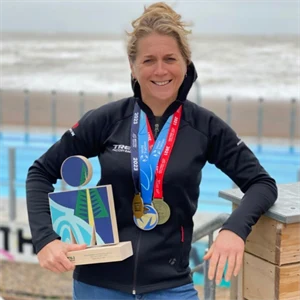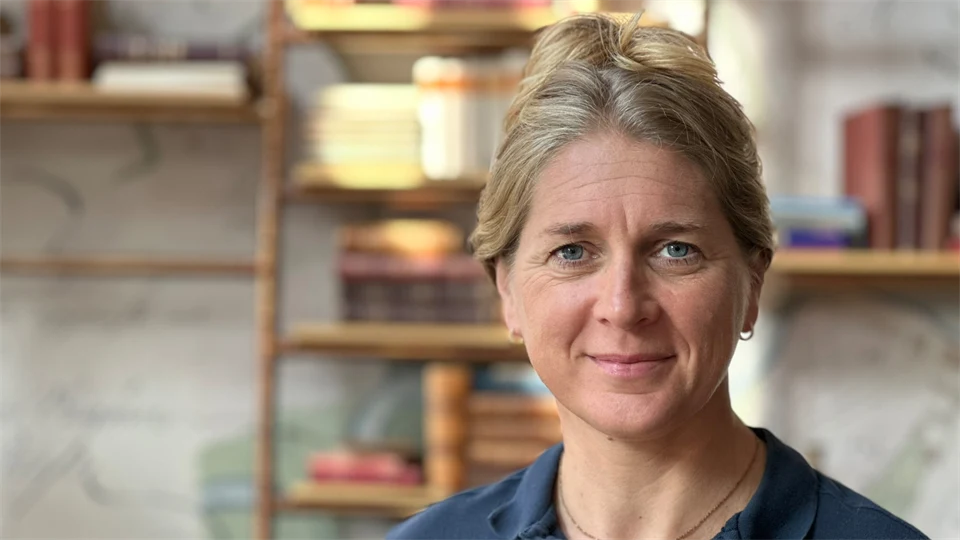Kerry is not only a professor, she is also a World Champion
On October 4th, Kerry McGawley will be inaugurated as professor at the academic ceremony. But in addition to a professor, she is also double World Champion in triathlon in her age group.
Kerry's inagural lecture is on October 3rd at Campus Sundsvall:
11.15-11.30 Kerry McGawley – Give them the tools and they will finish the job
Last year, Kerry became World Champion in triathlon in two different distances in the women's 45-49 age category. She won the first World Championship gold in Ibiza, Spain on May 7th at the 2023 World Triathlon Long Distance Championships. The distances were 3000 m swimming, 120 km cycling and 30 km running. She won the second World Championship gold in Lahti, Finland on August 26th at the 2023 IRONMAN 70.3 World Championships, where the distances were 1900 m swimming, 90 km cycling and 21.1 km running.

Kerry with the 2023 medal harvest.
"When I participate in World Championships, I compete for Great Britain. This year I plan to defend my title at the Ironman 70.3 World Championships in New Zealand on December 14-15.
How many hours do you train per week?
"It varies, usually I train between 11-16 hours per week, effective time. That’s not including transportation, changing and so on. So sport takes a lot of time. It feels a bit much sometimes because I am also ambitious and want to perform well at work.
What is your strength in triathlon?
"I feel that I'm evenly matched in all parts of the race, although I often have the fastest bike split of all women in my age group. Most of my competitors have a discipline where they are weaker, so my main strength is probably that I don't have a weakness. My competitors often have a background in one of the three disciplines, but I came from elite football.
"As a football player I had good endurance and was always strong in the physical tests, but not especially technically talented. I stopped playing when I was halfway through my PhD and started to focus more on endurance sport. Besides physical qualities triathlon – like many other sports – is a lot about mindset, discipline and willingness to train.
What is the most fun thing about your job?
"I like the variation between teaching students, supervision/mentorship and research. I get inspiration from leading the Master's program in sports performance and athlete health. It is also inspiring to carry out applied research in different areas.
"I have been on training camps with the cross-country ski and biathlon teams in Sweden and overseas. I have worked with national and international sports federations with education and research (e.g., the Swedish Sports Confederation – RF, International Biathlon Union – IBU and Swedish Triathlon). It is satisfying when I can be involved in and contribute to athlete development through research.
"One of the most fun parts of the job is the knowledge transfer, such as when I participate in podcasts, seminars, workshops, conferences and so on.
What are you looking forward to in the coming years?
"It wasn't that long ago that I was promoted to professor, but it has led me to reflect a lot on my academic career. I have achieved many goals, which means that I can relax a bit and use the 20-ish years I have left to be strategic, support younger researchers and make a difference.
Kerry has a large project underway that focuses on the female athlete, the project includes two research assistants, students and collaborators from several different countries.
"That project involves several qualitative and quantitative studies and will require a lot of focus and energy. We will study elite athletes and how their menstrual cycles and hormones affect training and performance. And we want to take it a step further by looking at specific solutions to problems and what support female athletes need to perform better and maintain good health.
"One of the studies will have a multicultural focus, where we will interview athletes from Africa, India, the Middle East and the Pacific Islands. We will examine how different cultures, traditions and religions affect elite athletes in terms of menstruation and hormone cycles in relation to training and competition.
"We will also conduct quantitative studies where we will measure sex hormones with elite female athletes who will test themselves at home using test kits. We will collect data on their hormone cycles over four months to see variations within and between individuals, as well as how performance and symptoms can be linked to hormonal fluctuations.
Contact

